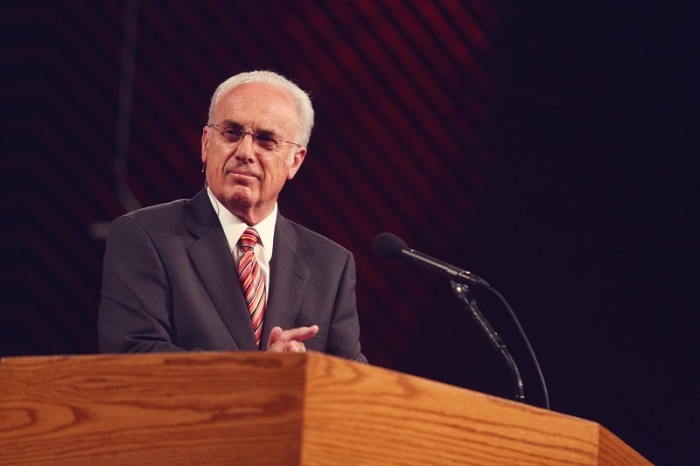Evangelicalism's 'Newfound Obsession' With Social Justice Is Threat to Gospel, John MacArthur Says
Anthony Bradley Calls Analysis 'a Pile of Ideological Conservative Rubbish'

Pastor John MacArthur argued that evangelicalism's "newfound obsession" with social justice is a threat to the Gospel.
In a Monday blog post on his Grace to You ministry website, MacArthur, leader of Grace Community Church of Sun Valley, California, and president of The Master's College and Seminary, promised to tackle the notion of "social justice" in a series over the next two weeks.
The focus on social justice by evangelicals is shifting focus away from the Gospel, he claimed.
"Evangelicalism's newfound obsession with the notion of 'social justice' is a significant shift — and I'm convinced it's a shift that is moving many people (including some key evangelical leaders) off message, and onto a trajectory that many other movements and denominations have taken before, always with spiritually disastrous results," he wrote.
"Over the years, I've fought a number of polemical battles against ideas that threaten the gospel. This recent (and surprisingly sudden) detour in quest of 'social justice' is, I believe, the most subtle and dangerous threat so far," he said.
MacArthur who opened the discussion by first establishing his bonafides as supporter of racial equality said Christian should be pursuing biblical justice which has "little in common with the secular, liberal idea of 'social justice.'"
"I deplore racism and all the cruelty and strife it breeds. I am convinced the only long-term solution to every brand of ethnic animus is the gospel of Jesus Christ. In Christ alone are the barriers and dividing walls between people groups broken down, the enmity abolished, and differing cultures and ethnic groups bound together in one new people (Ephesians 2:14–15). The black leaders with whom I ministered during the civil rights movement shared that conviction," he said.
MacArthur was not immediately available for further comment when Grace to You was contacted Monday.
He argued without highlighting any specific names that the talking points of the most vocal evangelicals on social justice are too worldly.
"The evangelicals who are saying the most and talking the loudest these days about what's referred to as 'social justice' seem to have a very different perspective. Their rhetoric certainly points a different direction, demanding repentance and reparations from one ethnic group for the sins of its ancestors against another," he said. "It's the language of law, not gospel — and worse, it mirrors the jargon of worldly politics, not the message of Christ. It is a startling irony that believers from different ethnic groups, now one in Christ, have chosen to divide over ethnicity. They have a true spiritual unity in Christ, which they seem to disdain in favor of fleshly factions."
Anthony Bradley, chairman of the program in religious and theological studies and associate professor of religious studies at King's College in New York City, called MacArthur's analysis "a pile of ideological conservative rubbish," in a Monday tweet.
"This. John MacArthur face plants in a pile of ideological conservative rubbish. If evangelicalism is going to have a future that reflects the Bible's teachings, nearly everything about this post must be in its past. Terrible," he wrote.
This. John MacArthur face plants in a pile of ideological conservative rubbish. If evangelicalism is going to have a future that reflects the Bible’s teachings, nearly everything about this post must be in its past. Terrible. https://t.co/6PwpEEvSMy
— Anthony Bradley (@drantbradley) August 13, 2018
MacArthur's concern mirrors that of a certain faction of Southern Baptists who asked the SBC to denounce social justice activism earlier this year.
"Social justice is deceptive, in that well-meaning Christians become unwittingly drawn into such ideology under the false assumption that social justice equates to standing up for people's rights and compassion," argued Pastor Grady Arnold of Calvary Baptist Church in Cuero, Texas, in a resolution submitted to the SBC.
"Social justice is based on Marxism and Postmodernism, and should be opposed because of its antibiblical stance and worldview, but still Christians are attempting to blend social justice with Christianity, however they must realize that to accept social justice ideology is to invite liberal theology and liberation theology into our churches, schools, and institutions," he added.
Arnold's resolution, which was submitted in May, came approximately one month after the conclusion of the "MLK50: Gospel Reflections From the Mountaintop" conference in Memphis, Tennessee, that was jointly organized by the SBC's Ethics & Religious Liberty Commission and The Gospel Coalition. The conference called on Christians to reflect on the state of racial unity in the church and wider culture.
In the wake of the conference, Fellowship Baptist Church in Sidney, Montana, which has been affiliated with the Southern Baptist Convention since 1980, announced that they planned to withdraw from the SBC "due to the ongoing social justice promoting, leftist progressivism, and mission drift away from the Gospel."





























